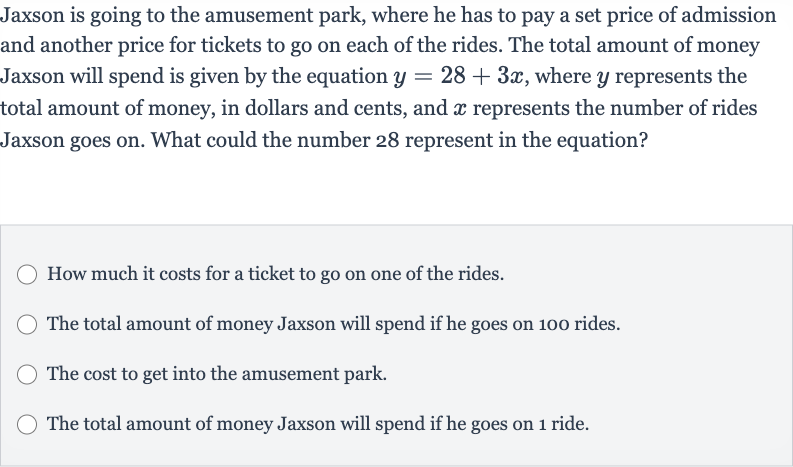AI tutor
Welcome to Bytelearn!
Let’s check out your problem:

Jaxson is going to the amusement park, where he has to pay a set price of admission and another price for tickets to go on each of the rides. The total amount of money Jaxson will spend is given by the equation , where represents the total amount of money, in dollars and cents, and represents the number of rides Jaxson goes on. What could the number represent in the equation?How much it costs for a ticket to go on one of the rides.The total amount of money Jaxson will spend if he goes on rides.The cost to get into the amusement park.The total amount of money Jaxson will spend if he goes on ride.
Full solution
Q. Jaxson is going to the amusement park, where he has to pay a set price of admission and another price for tickets to go on each of the rides. The total amount of money Jaxson will spend is given by the equation , where represents the total amount of money, in dollars and cents, and represents the number of rides Jaxson goes on. What could the number represent in the equation?How much it costs for a ticket to go on one of the rides.The total amount of money Jaxson will spend if he goes on rides.The cost to get into the amusement park.The total amount of money Jaxson will spend if he goes on ride.
- Analyze Equation Components: Analyze the equation to understand its components.The equation represents a linear relationship between the total amount of money Jaxson will spend () and the number of rides he goes on (). The number is added to the product of and , which suggests that is a fixed amount that does not change with the number of rides.
- Identify Coefficient Meaning: Identify what the number represents in the equation.The number is the coefficient of , which indicates the cost per ride. This means that for each ride Jaxson goes on, he will spend an additional .
- Determine Fixed Cost: Determine what the number could represent based on the structure of the equation.Since is not multiplied by and is a fixed amount, it is reasonable to conclude that represents a one-time cost that Jaxson will incur regardless of the number of rides he goes on. This one-time cost is most likely the admission fee to enter the amusement park.
- Evaluate Given Options: Evaluate the options given in the question to see which one fits the interpretation of the number .- "How much it costs for a ticket to go on one of the rides." This is incorrect because the cost per ride is represented by the number .- "The total amount of money Jaxson will spend if he goes on rides." This is incorrect because the total amount would be , which is more than .- "The cost to get into the amusement park." This is the most likely correct answer because it is a fixed cost, as represented by the number in the equation.- "The total amount of money Jaxson will spend if he goes on ride." This is incorrect because the total amount would be , which is more than .
More problems from Evaluate two-variable equations: word problems
QuestionGet tutor help
QuestionGet tutor help
QuestionGet tutor help
QuestionGet tutor help
QuestionGet tutor help
QuestionGet tutor help
QuestionGet tutor help
QuestionGet tutor help
QuestionGet tutor help
QuestionGet tutor help
